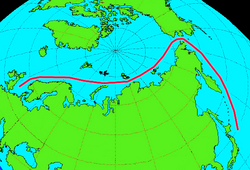Far North Fiber
Topic: Earth
 From HandWiki - Reading time: 3 min
From HandWiki - Reading time: 3 min
Far North Fiber, also called Far North Fiber Express Route, is a proposed 14,000 km long submarine fiber-optic cable connecting Japan and Europe by traversing the Northwest Passage.[1] The cable was proposed in December, 2021 by Finnish company Cinia (fi) and Far North Digital of Anchorage, Alaska.[2][3]
History

A 10,600 km Japan–Europe cable via the Northeast Passage polar route was conceived by Cinia and the Russian company MegaFon in 2018, and feasibility studies were conducted circa 2020 around the Norwegian enterprise Bredbåndsfylket Arctic Link AS.[4]
In March 2021, Cinia, Bredbåndsfylket, and MegaFon announced plans to create a Japan–Norway span through the Northeast Passage, called Arctic Connect. The Arctic Connect plans fell through in May,[5] and it was reconfigured as Far North.[6] The Russian government began laying cable on its own Northeast Passage six-pair submarine fiber system, Polar Express, in August 2021.[5][7][8]
References
- ↑ Simon Sharwood (21 December 2021), "New submarine cable to link Japan, Europe, through famed Northwest Passage", The Register, https://www.theregister.com/2021/12/21/far_north_fiber_proposal/
- ↑ Krestia DeGeorge (December 22, 2021), "A new Arctic fiber project aims to link Asia and Europe via the Northwest Passage", Arctic Today, https://www.arctictoday.com/a-new-arctic-fiber-projects-aims-to-link-asia-and-europe-via-the-northwest-passage/, "Alaska-based Far North Digital is teaming with Finland's Cinia on a new project connecting Japan with western Europe."
- ↑ Thomas Nilsen (December 21, 2021), "New trans-Arctic pathway for Asia-bound subsea cable" (in en), The Barents Observer (Norwegian Barents Secretariat), https://thebarentsobserver.com/en/industry-and-energy/2021/12/new-pathway-cinias-asia-bound-subsea-cable, "After Finnish state-owned operator Cinia and Russian MegaFon earlier this year put on hold plans to lay telecom cable from Europe to Asia north of Siberia, new partners have teamed up looking for an option via Iceland, Greenland, Canada and Alaska to Japan."
- ↑ Thomas Nilsen (September 29, 2020), "Trans-Arctic undersea cable attracts Norwegian and Japanese partners" (in en), The Barents Observer (Norwegian Barents Secretariat), https://thebarentsobserver.com/en/arctic/2020/09/trans-arctic-undersea-cable-attracts-norwegian-and-japanese-partners, "After Finnish state-owned operator Cinia and Russian MegaFon earlier this year put on hold plans to lay telecom cable from Europe to Asia north of Siberia, new partners have teamed up looking for an option via Iceland, Greenland, Canada and Alaska to Japan."
- ↑ 5.0 5.1 Gleb Stolyarov (August 6, 2021). "Russia starts operation to lay undersea fibre optic cable through Arctic". Reuters. https://www.reuters.com/technology/russia-starts-operation-lay-undersea-fibre-optic-cable-through-arctic-2021-08-06/.
- ↑ Trine JONASSEN (December 22, 2021), "New Cooperation about Arctic Subsea Fiber Cable – The 14,000-kilometers long cable is to reduce the optical distance between Asia and Europe and minimize delay in data traffic.", High North News (Nord University), https://www.highnorthnews.com/en/new-cooperation-about-arctic-subsea-fiber-cable, "After the previous collaboration stranded, resources are now put into a new project that is to lay a subsea fiber cable between North America, Asia, Northern Norway and Finland, this time through the Northwest Passage."
- ↑ "Polar Express". TeleGeography. https://www.submarinecablemap.com/submarine-cable/polar-express.
- ↑ "Murmansk-Vladivostok undersea fiber optic cable laying begins in Barents Sea". TASS. 9 August 2021. https://tass.com/economy/1323863.
Further reading
- Sebastian Moss (December 23, 2021), "Cinia and Far North Digital to develop $1.15bn pan-Arctic submarine cable connecting Japan, US, Canada, and Europe via Northwest Passage – Huge cable cuts through the Arctic as global warming opens up a new route", Data Center Dynamics, https://www.datacenterdynamics.com/en/news/cinia-and-far-north-digital-to-develop-115bn-pan-arctic-submarine-cable-connecting-japan-us-canada-and-europe-via-northwest-passage/
- Isabelle Bousquette (June 15, 2022). "A Warming Arctic Emerges as a Route for Subsea Cables". The Wall Street Journal. https://www.wsj.com/articles/a-warming-arctic-emerges-as-a-route-for-subsea-cables-11655323903.
External links
 |
 KSF
KSF